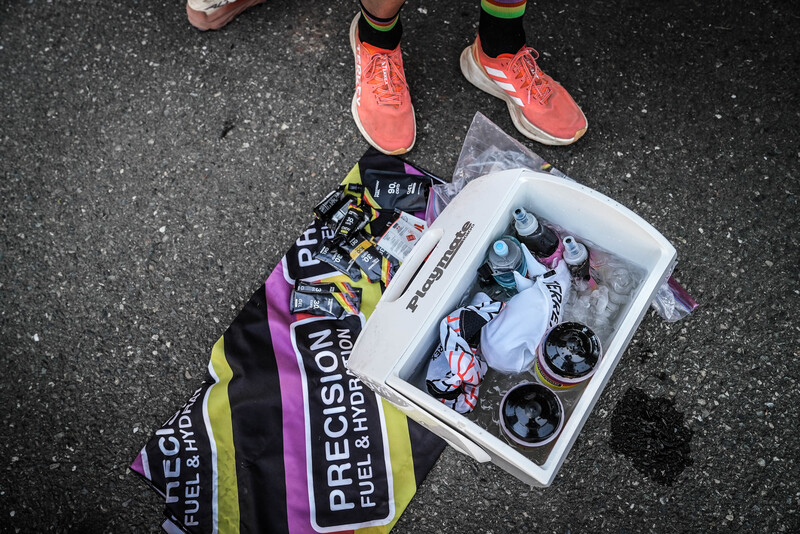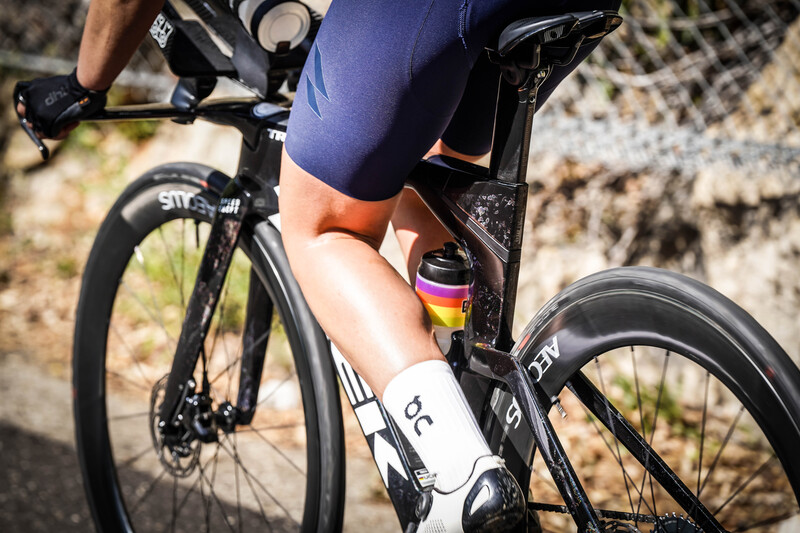The Olympics is always a time of great performances and stories as legends are forged and reputations made. However, just because you may never reach the doors of your local tattooist to get those five rings immortalised on your skin, there's still plenty you can learn from what's happened in Paris.
Here are five highlights I noticed...
1. It ain't over 'til it’s over
British MTB rider Tom Pidcock is no stranger to fighting his way through the field. His constant juggling match between road and MTB race calendars had often seen him with a poor position on the MTB starting grid. Plus, race long enough and you’ll get a mechanical mishap in your triathlon or bunch race at some point.
So, in seemingly the right place, with the right form at the right time, things went from ‘oui’ to ‘non’ in Paris for Pidcock when an unwanted flat on lap 4 saw him go from the lead group to being back down in 9th place.
However, a total absence of panic allied with trust in his ability saw him claw his way back through the field to be all over leader Victor Koretzky’s rear wheel on the final lap. With pretty much the last chance he had, and with a few hundred metres left to ride, he took a daring and aggressive inside line through the trees and got his bars in front. He could have settled for silver rather than gambling on a manoeuvre that could have seen both riders crash out to win nothing.
Takeaway: Any mechanical or breakages are pretty much part and parcel of our racing, so when they happen to you, hang in there - it doesn’t mean you won’t see the finish line or even enjoy success.
2. Be flexible...
The conditions of the individual triathlon events had seen some discussion. Many of us were aware of the situation regarding swimming in the River Seine that involved varying water quality, athletes flirting with the potential risks of E.coli contraction and the risk of a triathlon becoming a duathlon.
Then there were the subsequent delays to the race dates which, given the delicate nature of a taper that sat on the top of four years preparation, seemed absurd to anyone that knew anything about athlete preparation.
Behind the scenes, this delay would also have affected the nutrition and hydration preparation both prior to and during the event itself as athletes would've needed to constantly reset or tweak their fueling.
Furthermore, the conditions for the men's and women's events couldn’t have seen more different weather, despite being on the same course and mere hours apart. The women’s event started off cool and with wet surfaces after rain the previous evening. The men’s event though was dry and saw increasingly hot conditions.
It was critical that the athletes were aware of the conditions they would face and be flexible to their own personal hydration and fueling strategies going into the event.
Takeaway: Despite doing the same sport, at nearly the same time, against similar athletes, doesn’t mean you deploy the same solutions.

3. If at first you don’t succeed...
There was some controversy (and the usual social media keyboard quarterbacking) when American triathlete Taylor Knibb won her national cycling time trial championships and was then selected for the cycling team at the Paris Games.
Plenty had opinions on whether a triathlete could be competitive in what should probably be viewed as a different sporting discipline. The result of this wasn’t a pretty one.

In what were slippery conditions (and on a surface at times that seemed closer to Roubaix than Paris), Knibb crashed... and crashed again... and crashed again. This seemed to vindicate some viewpoints that there's more to being an elite cyclist than being strong on a bike and being familiar with aerobars.
Then, her efforts in the triathlon event didn’t yield much reward either as she finished in a virtually unnoticed 19th place.
However, a few days later she anchored her US team in the triathlon relay event with a strong performance that saw them take a fantastic silver medal. Many other athletes may have quit, gone home or listened to the critics. However, in the end, she got the silverware than most of her contemporaries won’t see.
Takeaway: In your own case, a bad race or three doesn’t mean your season is awful or over – it only takes one good day to turn it all around.
4. In spite of or because of technology?
Now I have a bit of an issue with track athletics. I have long held the belief that unlike many other sports, there remains too much reliance on ability and not enough spent on leveraging any legal technologies in events where fractions matter.
The men’s 100m final in Paris has subsequently been billed as the fastest ever held. American Noah Lyles won the event in 9.79 but needed the use of three decimal places to do it when looking at the finish line photo.
However, these athletes hit a terminal velocity of around 28mph and we know from cycling that aerodynamics is a huge deal at those kinds of speeds. At which point, you have to wonder if the 0.001 that Kishane Thompson lost by wasn’t partially due to his loose vest.
Critics could argue that Usain Bolt was perfectly fine when he set the world record some years ago when wearing similar attire, but I often say that any good result can be in spite of certain factors, not because of them.
Some recent science has also shed some light on such concerns but when applied to the long jump event. Both the clothing and even the hairstyle of the athlete were shown to vary the total drag of the athlete by up to 25%. At which point, I would argue that you’d need pretty convincing data to be wearing looser clothing or not heading to your barbers.
Takeaway: Ultimately, as TV’s man mountain Jack Reacher rightfully said, “details matter”.
5. It’s not all about the technology
This final tale may seem somewhat odd coming from a sports technologist but it’s easy to get hung up on the equipment we use to compete. We can have a tendency to see our performances affected either positively or negatively because of our lack of or abundance of latest technology.
Some of this is based on physics but some is based on psychological impacts such as technophobia or technophilia. Enter Turkish pistol shooter Yusuf Dikec.
Whereas someone like South Korea's Kim Yeji has become something of a fashion icon at the 2024 Olympics with her special glasses that make her look something closer to Jean Claude Van Damme in ‘Universal Soldier’, Dikec appeared to saunter out in casual team clothing and wearing seemingly regular eyeglasses. He then casually placed his hand in his pocket as he shot... and won a silver medal.
Takeaway: The lesson being, if it works for you, it works for you.
